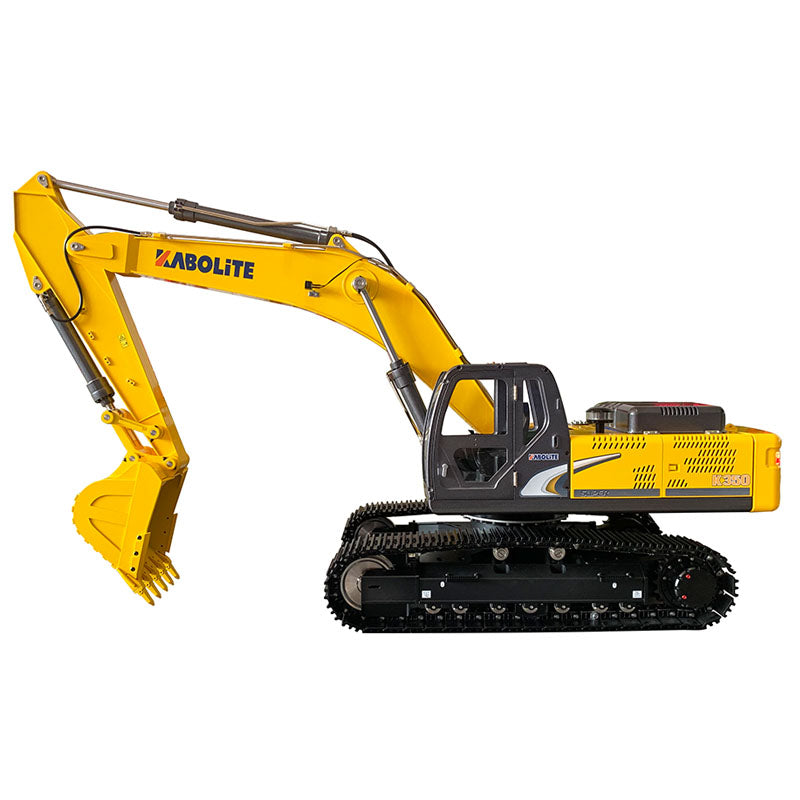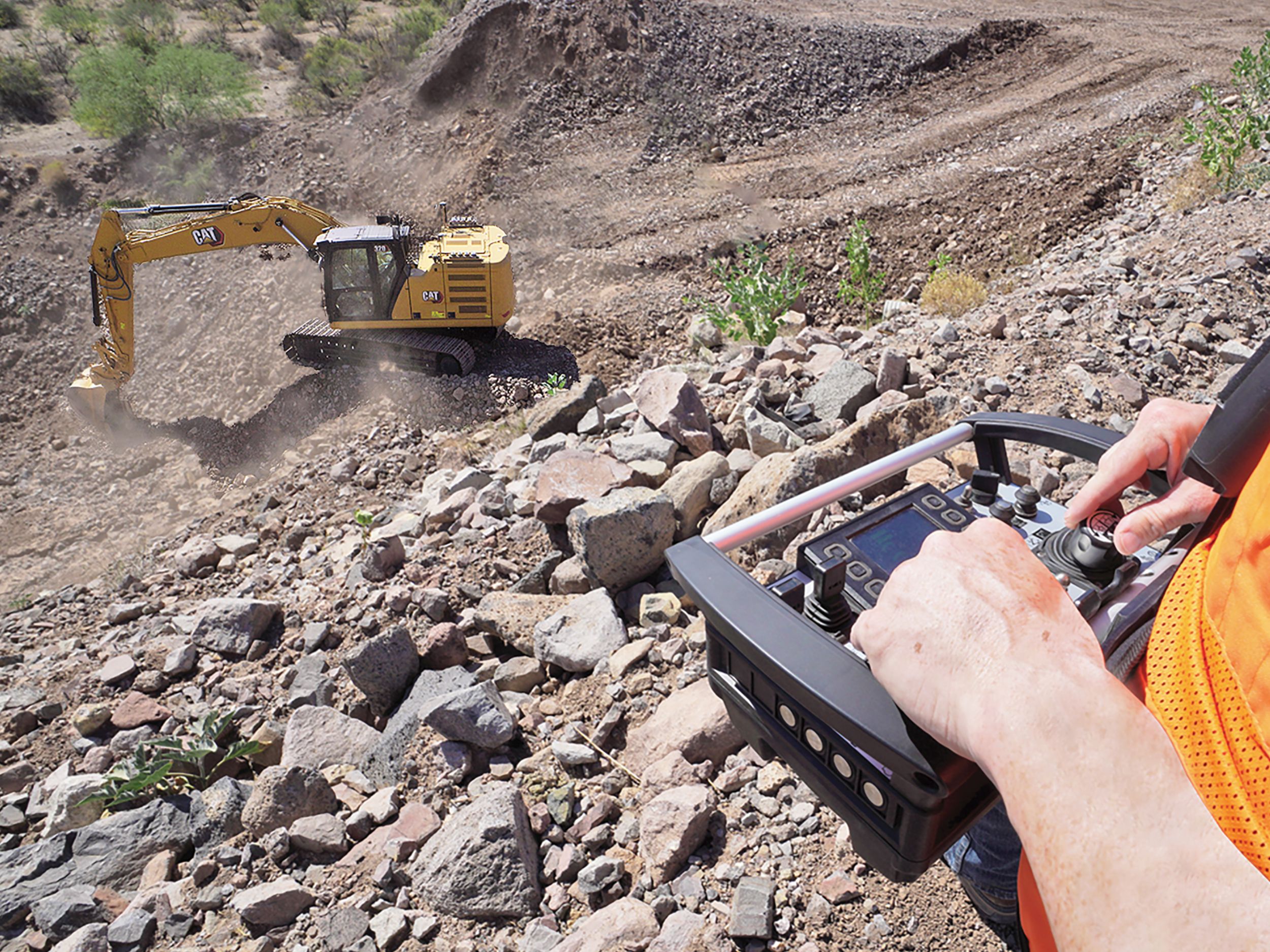Why the Double E Volvo rc excavator Is a Top Choice for Excavation Professionals
Wiki Article
Recognizing Just How Excavator Works and Its Influence On Performance
Excavators play a necessary role in building and construction and mining operations, counting on a complicated interaction of mechanical and hydraulic systems. Their capacity to execute a range of jobs pivots on both their design and the technology integrated within. Comprehending these parts can considerably influence functional effectiveness and productivity. As developments continue to reshape the sector, one should take into consideration just how these changes will certainly affect future techniques and efficiency.The Fundamentals of Excavator Mechanics

The Duty of Hydraulic Equipments in Excavators
At the heart of excavator procedure lies the hydraulic system, which plays a pivotal role in powering the equipment's activities and functions. This system makes use of pressurized hydraulic fluid to transfer power, enabling various actions such as excavating, swinging, and training. By using the concepts of hydraulics, excavators can carry out tasks with exceptional accuracy and force, boosting general operational efficiency.The hydraulic system includes vital components, including pumps, cyndrical tubes, and valves, which function with each other to regulate the circulation and instructions of the liquid. When the operator engages the controls, the hydraulic liquid is directed to certain cylinders, equating the driver's commands into physical movement. This mechanism permits smooth and responsive actions, which are necessary in building and excavation environments. double e volvo rc excavator. The efficiency of the hydraulic system directly impacts the productivity and adaptability of the excavator, making it a vital component in modern excavation proceduresSecret Elements of an Excavator
Comprehending the vital components of an excavator is vital for understanding exactly how this powerful machine runs. An excavator consists of numerous considerable elements, including the undercarriage, home, container, arm, and boom. The undercarriage offers stability and wheelchair, frequently including wheels or tracks to navigate various terrains. Your house consists of the engine and hydraulic systems, permitting the driver to control motion and power the maker. The boom prolongs from your home, enabling upright reach, while the arm attaches to the pail, facilitating digging and lifting operations.Additionally, the taxicab houses the driver, geared up with controls for specific maneuvering. Each of these elements plays an essential role in the excavator's general capability, contributing to its efficiency and performance on construction sites. Understanding these parts assists in maximizing and maintaining excavator efficiency, guaranteeing jobs are completed safely and efficiently.Add-on Adaptability and Its Benefits
Add-on adaptability is an essential element of excavators, making it possible for drivers to switch over in between numerous devices customized for particular tasks. This flexibility not just improves work performance yet also adds to cost-effectiveness by minimizing the need for several equipments. Comprehending the different kinds of attachments readily available can significantly affect the total performance and capability of an excavator on task websites.Sorts of Attachments
While excavators are largely acknowledged for their excavating abilities, their true flexibility depends on the large variety of attachments readily available. These attachments enhance the excavator's performance, enabling it to carry out different jobs beyond excavation. Common attachments consist of pails (for digging and scooping), hydraulic thumbs (for understanding products), and augers (for drilling openings) Grapples are utilized for relocating and managing particles, while rippers can break up hard surfaces. Other specialized accessories, such as plates and rakes, enable excavators to adjust to details task requirements. This diversity not only increases the machine's utility across various markets, consisting of building, landscaping, and demolition, yet additionally allows drivers to customize their equipment to meet details job demands successfully.Boosted Task Effectiveness
Maximizing work efficiency is a main benefit of utilizing various excavator add-ons. Various accessories allow an excavator to carry out several jobs without needing to switch equipment, saving important time and labor. For circumstances, using a hydraulic hammer can break concrete while a container add-on can dig deep into dirt, enabling a seamless workflow. This adaptability lowers downtime connected with equipment adjustments and enhances productivity on-site. In addition, specialized accessories improve precision in jobs such as grading or landscape design, resulting in greater top quality results. The capability to adapt to various task requirements not only enhances operations but additionally decreases the need for additional equipment, ensuring that tasks are finished quickly and efficiently. Overall, accessory adaptability significantly adds to increased task efficiency in excavation work.Cost-Effectiveness and Convenience
Cost-effectiveness is a significant advantage of using functional excavator accessories. These add-ons allow a single excavator to do numerous jobs, decreasing the demand for extra machinery and labor - double e volvo rc excavator. By changing between containers, hammers, and grapples, drivers can deal with various jobs, from excavating to demolition, consequently maximizing equipment application. This adaptability not just lowers operational costs yet also decreases downtime connected with transforming equipment. Additionally, the ability to customize excavators with specialized add-ons enhances performance, as they can successfully deal with diverse tasks according to project needs. To wrap up, the mix of cost-effectiveness and flexibility in excavator attachments adds to enhanced functional efficiency and source allotment in construction and excavation tasks
Advanced Modern Technology in Modern Excavators
Modern excavators are increasingly geared up with sophisticated technology that changes excavation procedures. Automation simplifies operations, while boosted gas effectiveness decreases functional expenses. Furthermore, clever control systems improve precision and security, noting a substantial development in excavation tools.Automation in Excavation Processes
As excavation innovation advances, automation has arised as an essential element in boosting performance and precision on job websites. Modern excavators are outfitted with sophisticated automated systems that promote tasks such as grading, excavating, and trenching with very little driver intervention. These systems utilize sensing units, GPS, and machine learning algorithms to ensure accurate positioning and depth control, greatly lowering the margin for mistake. Furthermore, automation enables operators to concentrate on critical decision-making as opposed to manual controls, leading to enhanced productivity on the whole. Such technologies not just improve process yet likewise enhance security by decreasing human error in complicated procedures. Consequently, the assimilation of automation in excavation processes stands for a substantial improvement in building and construction technology, driving the sector towards better effectiveness and effectiveness.Enhanced Fuel Efficiency
Developments in innovation have actually also caused considerable improvements in fuel effectiveness for contemporary excavators. Modern equipments are outfitted with sophisticated engines that enhance power outcome while decreasing fuel usage. These engines make use of cutting-edge burning technologies, such as turbocharging and direct fuel shot, to boost performance and efficiency. In our website addition, light-weight materials in building and construction reduce general weight, permitting for less energy expenditure during operation. The intro of variable rate controls allows operators to change engine performance according to certain tasks, further minimizing gas usage. Consequently, these improvements not just reduced operational expenses but also add to environmental sustainability by minimizing exhausts. On the whole, boosted fuel efficiency in excavators is a vital development that strengthens performance and economic viability in the building sector.Smart Control Equipment
While drivers navigate increasingly intricate task websites, wise control systems in excavators have become crucial devices for boosting effectiveness and accuracy. These advanced innovations use formulas and sensors to check various criteria such as load weight, surface conditions, and functional efficiency. By immediately adjusting hydraulic features, smart systems maximize device performance, causing enhanced performance and minimized endure elements. In addition, operators profit from instinctive interfaces that provide real-time comments and diagnostics, enabling informed decision-making. This combination of technology not just improves procedures yet also minimizes human mistake, adding to much safer workplace. As the building and construction industry remains to progress, smart control systems will certainly play an important duty in forming the future of excavator effectiveness and performance.Enhancing Operational Effectiveness With Excavators
Excavators play a crucial duty in enhancing functional effectiveness throughout numerous building and excavation projects. Their versatility permits for multiple jobs, consisting of product, excavating, and lifting handling, which streamlines process and minimizes the need for extra tools. With effective hydraulic systems, excavators can carry out durable tasks with precision, considerably lowering the time needed to full jobs. The combination of advanced modern technology, such as GPS and automated controls, additionally maximizes their procedure, making it possible for operators to accomplish better precision and minimize material waste. Furthermore, modern-day excavators are made to consume much less gas and reduce discharges, adding to both price financial savings and environmental sustainability. By using excavators efficiently, building teams can enhance productivity, satisfy job deadlines, and improve total website administration. This multifunctionality and performance make excavators crucial devices in the modern-day construction landscape.The Future of Excavators in Building and Mining Industries
As the building and construction and mining industries evolve, the future of excavators is poised for significant makeover driven by technical development and altering functional needs. Breakthroughs in automation and synthetic knowledge are reshaping excavator capabilities, permitting improved precision and effectiveness in procedures. Independent excavators are arising, lowering the demand for human intervention and minimizing the danger of accidents.Moreover, the combination of telematics and IoT modern technology enables real-time monitoring of equipment efficiency and anticipating maintenance, optimizing uptime. Green designs, including hybrid and electric versions, are getting traction, lining up with sustainability goals within the industry.Additionally, making use of innovative products and lighter layouts boosts fuel efficiency while preserving efficiency criteria. As these fads development, excavators will play an important function in satisfying the raising needs for efficiency and safety in building and construction and mining, inevitably changing functional landscapes.Regularly Asked Questions
How Do Weather Impact Excavator Efficiency?

Weather considerably influence excavator efficiency, as rainfall and mud can impede grip and stability, while extreme temperatures may affect hydraulic systems. Operators has to click adapt to these variables to ensure perfect performance and safety and security during procedures.
What Precaution Should Operators Adhere To While Making Use Of Excavators?
Safety and security procedures for excavator operators consist of using ideal individual protective devices, carrying out pre-operation evaluations, guaranteeing proper communication with ground workers, preserving a secure distance from overhead hazards, and adhering to established operational procedures to stop mishaps.Exactly How Commonly Should Excavators Be Preserved for Optimum Efficiency?
Excavators must be maintained frequently to guarantee peak performance, generally every 250 operating hours or as defined by the producer. Routine checks improve dependability, avoid unexpected malfunctions, and extend the life-span of the tools.
What Is the Average Life Expectancy of an Excavator?
The typical lifespan of an excavator commonly varies Recommended Site from 10,000 to 15,000 hours of operation. Elements affecting durability include maintenance techniques, operating problems, and the quality of the machine itself, impacting total productivity and efficiency.
Can Excavators Operate Irregular Surface Successfully?
Excavators can run efficiently on unequal terrain because of their verbalized designs and adjustable tracks. These features enable them to keep security and grip, making it possible for efficient operation in challenging settings typically encountered in building and construction and landscaping jobs. Each of these components plays an important role in the excavator's overall capability, adding to its efficiency and performance on building websites. Taking full advantage of task performance is a main benefit of utilizing various excavator accessories. While operators navigate increasingly complicated task sites, wise control systems in excavators have emerged as important devices for boosting effectiveness and precision. Excavators play a necessary role in enhancing functional effectiveness across various building and excavation tasks. Advancements in automation and man-made knowledge are reshaping excavator abilities, permitting for boosted precision and efficiency in procedures.Report this wiki page